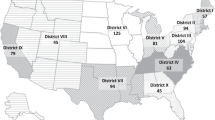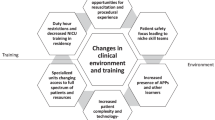Abstract
Background
The topic of neonatal cardiovascular care in neonatal-perinatal medicine (NPM) fellowship training has continued to transform due to increased complexity of patients, development of specialized units, continued Accreditation Council for Graduate Medical Education requirements, and clinical practice variation across centers that care for neonates with congenital heart disease (CHD).
Methods
We developed a neonatal cardiac curriculum comprised of eight interactive sessions with novel active learning concepts specific to our NPM fellows. A self-assessment survey in comfort in managing infants with CHD and perceived competency in neonatal cardiology topics was performed by all neonatology fellows at baseline and after completion of the curriculum. The American Board of Pediatrics Subspecialty In-training Exam (SITE) scores for fellows were compared to that of the national average.
Results
The average comfort score (0–100) of the first-year fellows increased from 33 to 76, and that of the second and third-year fellows increased from 72 to 86, and 75 to 86, respectively. The first-year fellows improved their competency score by 44 points (3 standard deviations), the second-year fellows improved their score by about 26 points (one standard deviation), and there was an overall 9-point increase in the competency score of all fellows (one standard deviation). The average local SITE score was lower than the national average before the initiation of this curriculum, became nearly equal to the national average score at the end of the first year the curriculum was implemented, and has progressively become higher since then.
Conclusion
Due to the variable clinical exposure and differing practice models of managing CHD a neonatal cardiac curriculum may be beneficial to NPM trainees.
This is a preview of subscription content, access via your institution
Access options
Subscribe to this journal
Receive 12 print issues and online access
$259.00 per year
only $21.58 per issue
Buy this article
- Purchase on Springer Link
- Instant access to full article PDF
Prices may be subject to local taxes which are calculated during checkout


Similar content being viewed by others
Data availability
The authors confirm that the data supporting the findings of this study are available within the article and its supplementary materials.
References
French HM, Leeman KT, Wambach JA, Malik SK, ONTPD Fellowship Directors Writing Group, Reber KM. Essentials of Neonatal-Perinatal Medicine fellowship: an overview. J Perinatol. 2022;42:269–76.
Cicalese E, Wraight CL, Falck AJ, Izatt SD, Nair J, ONTPD Fellowship Directors Writing Group, Lawrence KG. Essentials of Neonatal-Perinatal Medicine fellowship: part 2 - clinical education and experience. J Perinatol. 2022;42:410–5.
Gray MM, Bruno C, French H, Myers P, Carbajal MM, Reber KM. Changes, challenges, and variations in neonatal-perinatal medicine fellowship: a view from the program directors. Am J Perinatol. 2024;41:e163–e173.
Leon RL, Levy PT, Hu J, Yallpragada SG, Hamrick SEG, CHNC Cardiac Focus Group. Practice variations for fetal and neonatal congenital heart disease within the Children’s Hospitals Neonatal Consortium. Pediatr Res. 2023;93:1728–35.
Levy VY, Bhombal S, Villafane J, McBride ME, Chung S, Figueroa M, Neonatal Cardiac Care Collaborative (NeoC3). Status of multidisciplinary collaboration in neonatal cardiac care in the United States. Pediatr Cardiol. 2021;42:1088–101.
“ACGME Program Requirements for Graduate Medical Education in Neonatal-Perinatal Medicine.” Accreditation Council for Graduate Medical Education. Editorial revision: effective 2020. https://www.acgme.org/globalassets/pfassets/programrequirements/329_neonatalperinatalmedicine_2020.pdf
“Neonatal-Perinatal Medicine Content Outline.” The American Board of Pediatrics. 2022. https://www.abp.org/sites/public/files/pdf/content-outline-neon.pdf
Sen S, Levy PT, Hamrick SEG, Ali N, Osborne SW, Rios DR, Children’s Hospitals Neonatal Consortium (CHNC) Cardiac Focus Group. Training pathways and careers for neonatologists interested in cardiovascular care. J Perinatol. 2022;42:534–9.
Kern DE, Thomas PA, Hughes MT, eds. Curriculum Development for Medical Education: A Six-Step Approach. 2nd ed. Baltimore, MD: Johns Hopkins University Press; 2009.
The American Board of Pediatrics, Content Outline – Neonatal Perinatal Medicine for Subspecialty In-Training, Certification, and Maintenance of Certification Examinations, Neonatal-Perinatal Medicine Content Outline (abp.org)
French H, Arias-Shah A, Gisondo C, Gray MM. Perspectives: the flipped classroom in graduate medical education. Neoreviews. 2020;21:e150–e156.
Young TP, Bailey CJ, Guptill M, Thorp AW, Thomas TL. The flipped classroom: a modality for mixed asynchronous and synchronous learning in a residency program. West J Emerg Med. 2014;15:938–44.
Author information
Authors and Affiliations
Contributions
Authors SP, PK, PM, and SS equally contributed to the design, collection of data and analysis, and writing of this manuscript.
Corresponding author
Ethics declarations
Competing interests
The authors declare no competing interests.
Additional information
Publisher’s note Springer Nature remains neutral with regard to jurisdictional claims in published maps and institutional affiliations.
Supplementary information
Rights and permissions
Springer Nature or its licensor (e.g. a society or other partner) holds exclusive rights to this article under a publishing agreement with the author(s) or other rightsholder(s); author self-archiving of the accepted manuscript version of this article is solely governed by the terms of such publishing agreement and applicable law.
About this article
Cite this article
Patel, S.G., Koenig, P., Myers, P. et al. Development of a neonatal cardiac curriculum for neonatal-perinatal medicine fellowship training. J Perinatol (2024). https://doi.org/10.1038/s41372-024-01986-4
Received:
Revised:
Accepted:
Published:
DOI: https://doi.org/10.1038/s41372-024-01986-4



